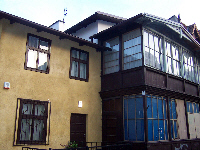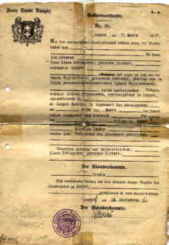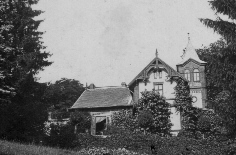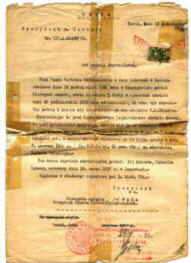
Home
Pilot
Escape
303 Squadron 1
303 Squadron 2
A New Home
and Finally
Links
Contents
| |
Home and School...
|
Miroslaw Ignacy
Wojciechowski was born on 6th March 1917, in the small village of Zoppot
on the shores of the Baltic Sea. The family had houses here, in Warsaw and
in Torun. He was one of five children born to Ignacy Wojciechowski
and Wanda Gertruda Wojciechowska (nee Behrendt), having three older sisters - Halla,
Janka and Marisia and a younger brother, Roman. |

Mirek,
held by his mother Wanda and with his
sister Marisia, Torun Autumn 1917
|
|

The
house on Annenstrasse, Zoppot (now Ceynowy Floriana, taken 2006) |
The house where Mirek was born, 2
Annenstrasse, Zoppot is still there. Of course, whilst the house
number remains the same, the street (as were
all streets in all "German" towns in Poland after the war) has
been renamed - Ceynowy Floriana - after a famous 19th century Kashubian and
Polish nationalist. The town now has a Polish spelling - Sopot. |
| Whilst in 1917 Poland was
becoming an independent country, having already effectively driven two of
the three partitioning empires from its borders (Austro-Hungary and
Prussia), war still continued on the Eastern front. Poland's citizenry
would suffer almost as heavily in the First World War as they would in the
Second. Even at the end of the war, Poland would not be at peace until the
invading Soviet Red Army was defeated almost at the gates of Warsaw;
Mirek's father fought on horseback with the Polish cavalry at the battle
of Zamosc where Lenin's armies (led by Stalin) were driven back.
Poland's new Statehood and her new borders would clearly owe much to her own
efforts. Swathes of land to the east, not Polish speaking by any means,
and including the historical capital Lwow of the old Polish-Lithuanian
empire, would be appropriated to the new country. Lands to the west, with
a minority of German speaking inhabitants, would be left to Germany or
carved into the Danzig Corridor and the Free State of Danzig, an area now
covered by Gdynia and the more famous Gdansk. |
| Zoppot fell within the Frei
Stadt Danzig. When, in 1932, the family needed a copy of Mirek's
register of birth, it would be in German. It identifies his father as
an "im felde abwesenden Gutsbesitzers" - literally an "in the field absentee
landlord". It gives the families religion as "katholischer".
As this was a legal document, it also gives the name of the midwife who attended the
birth; Klara Schlagowska (nee Richert).
|

German
proof of birth |
|

Janka,
Halla, Mirek and Marisia with their mother, Torun 1925
|
Mirek grew up in Torun. After
his father's death in 1926, the family did not often go to Warsaw.
Although plans had been made for him to go away to school, his mother
decided to keep the family close by and he attended a local school.
By 1930, he had decided he wanted to join
the Polish Air Force. This was much against his uncles' wishes, for they were
cavalrymen like his father. However, his mother allowed it.
|
|

The
house at Torun, 1925 |
Mirek completed his school
education in 1933. He gained satisfactory or very good marks in most
subjects. Despite being fluent in German, he was graded only satisfactory.
In keeping with Polish bureaucratic tradition, his birth date is again
given incorrectly at 6th March 1918.
|
| As an interesting footnote, he
was examined in Geography with particular reference to his knowledge
of modern Poland. In addition, he would not be able to enter the Air Force Academy without
proof of his Polish citizenship. Poland was a new country, younger even than
he was; his mother obtained the necessary copy of the entry in the
register of births from Zoppot and then took the oath of citizenship for
herself and for her son in 1932. |

Mirek,
second from left front row at school, Torun 1927 |
|

Wanda
Gertruda Wojciechowska's "Sworn Affidavit of Citizenship, 1932 |
The "Sworn Affidavit of
Citizenship" was a common document; in it, Mirek's mother renounced claims to any other state and by laws enacted for this specific
purpose in 1920, claimed and was given Polish citizenship.
The last paragraph, almost as an
afterthought, gives the same rights of citizenship to her son, Miroslaw
Ignacy, born on 16th March 1917. (Clearly, the Polish State, in its
eagerness to claim subjects, didn't worry too much about the accuracy of
birth dates.) |
|
